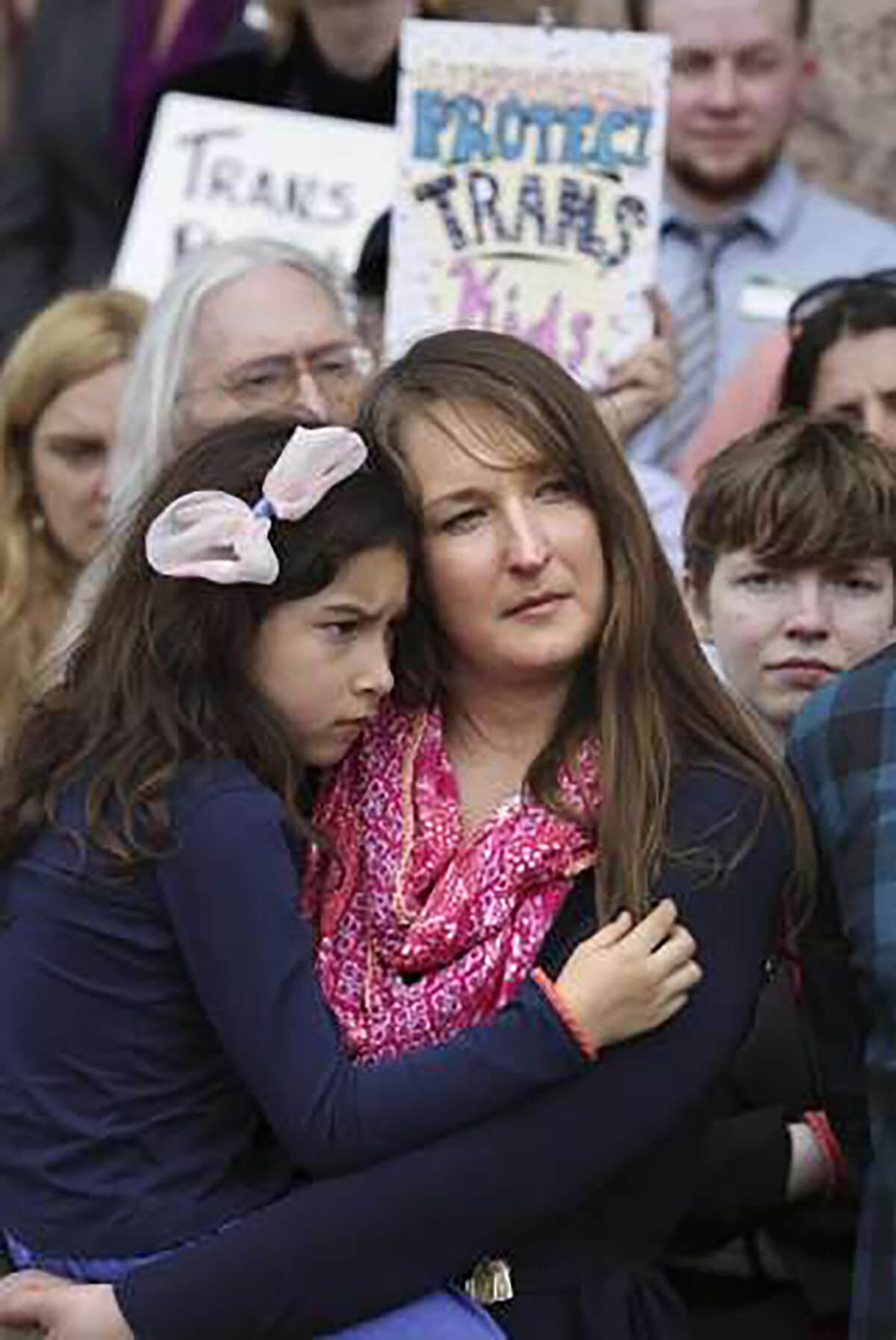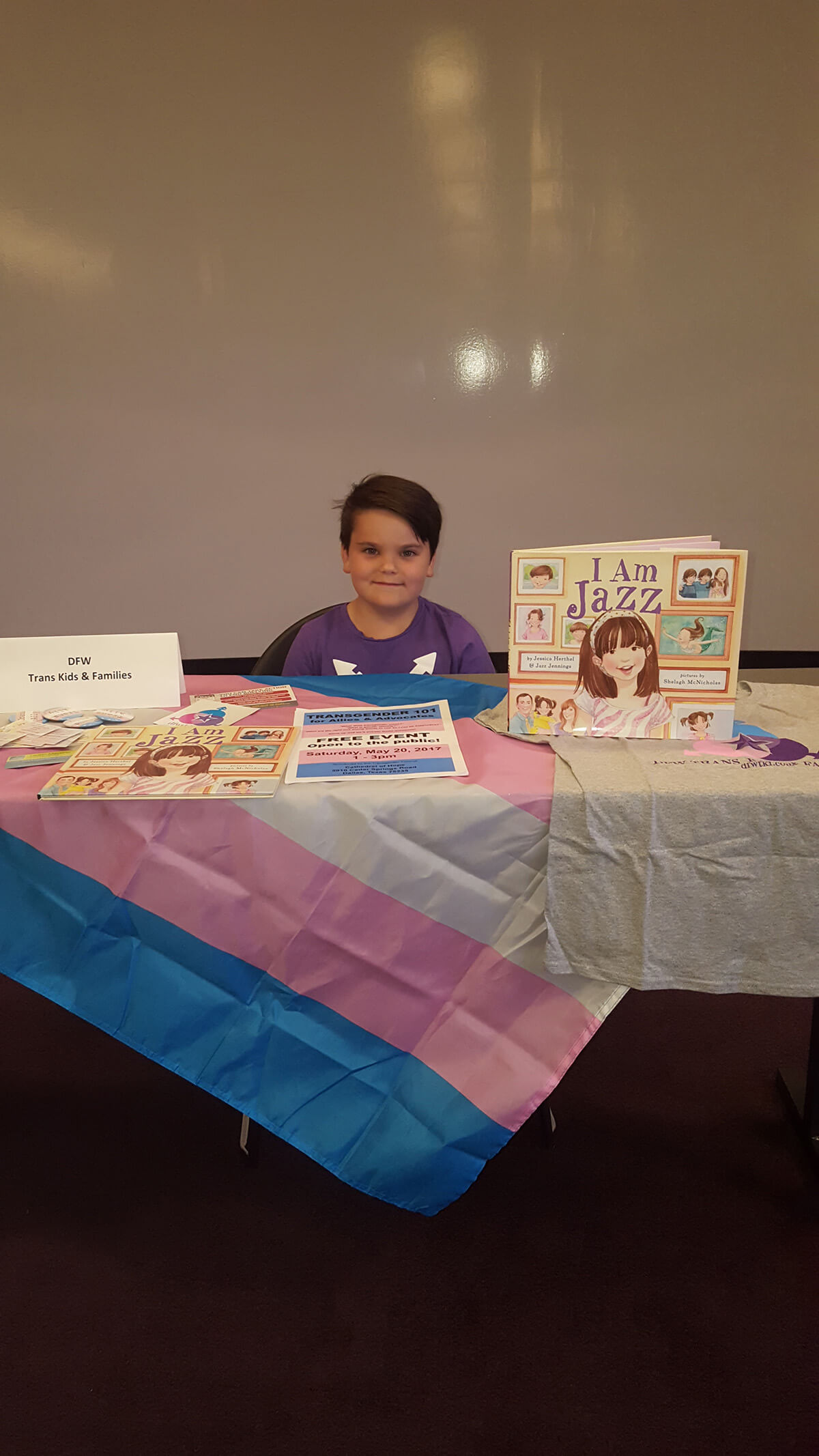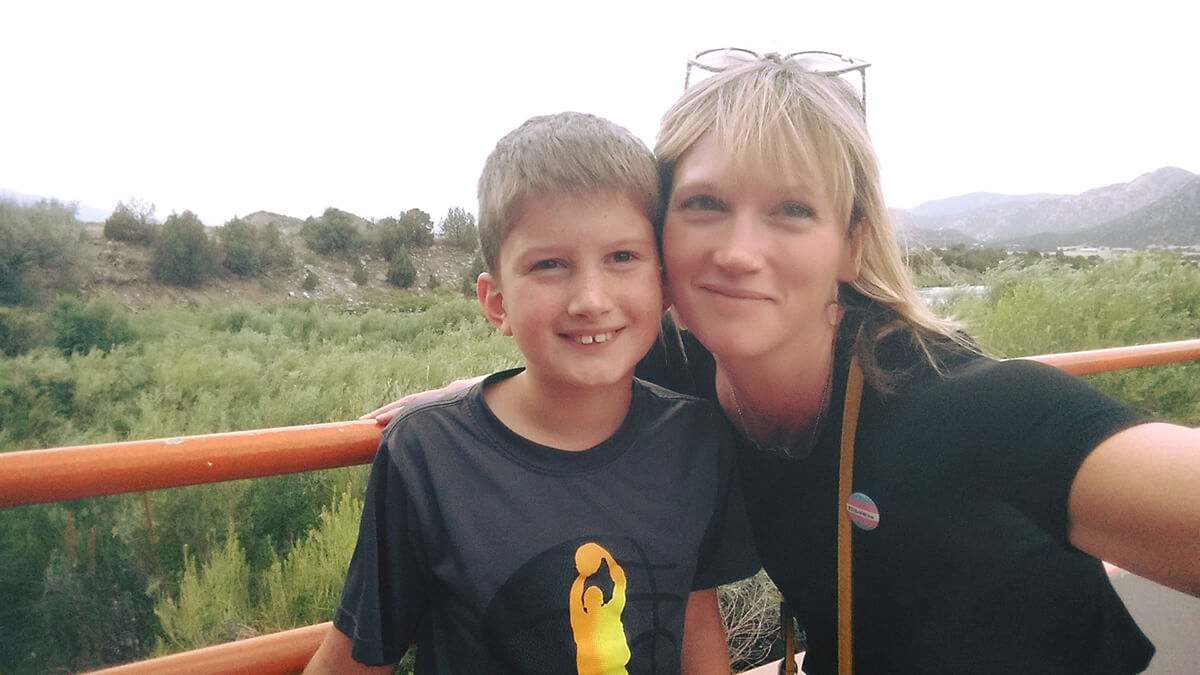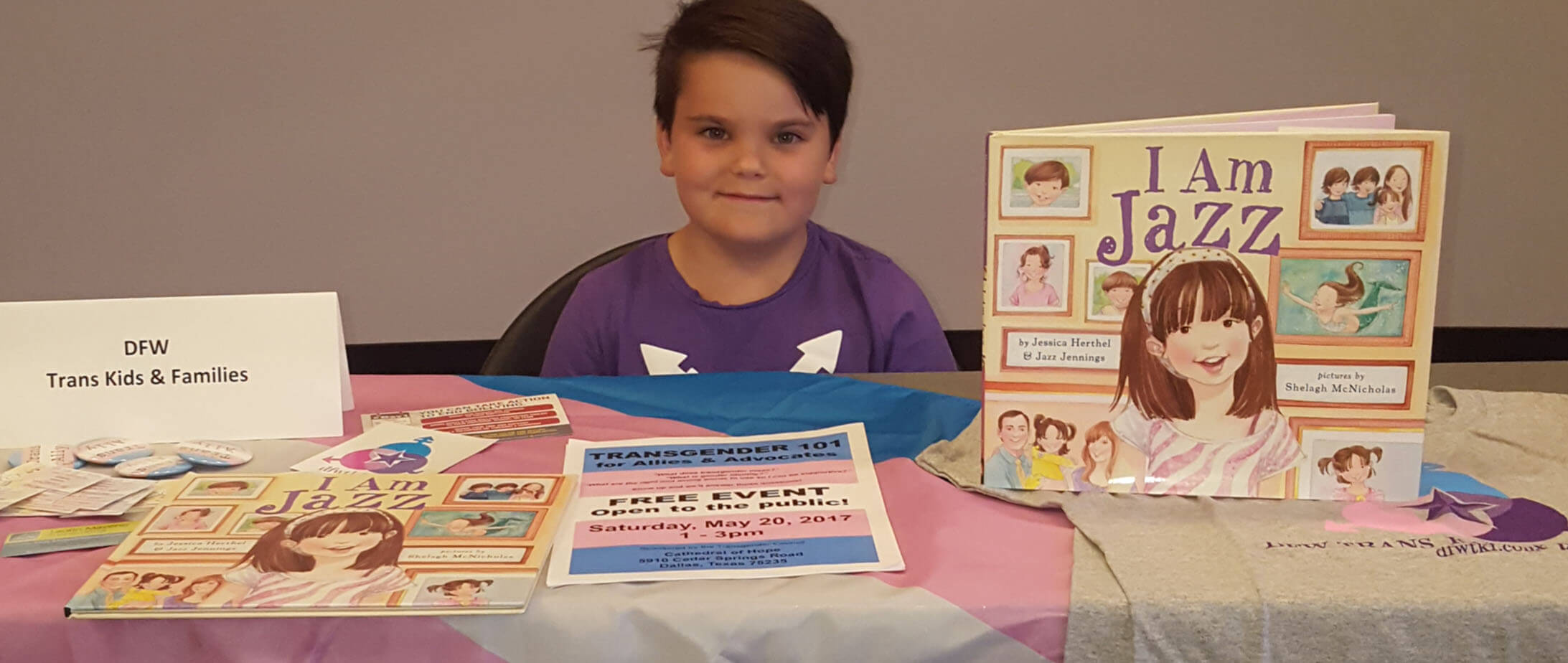For as long as she can remember, Melissa Ballard’s entire life has revolved around her faith.
Because her children were homeschooled, the evangelical church was where her family found community. The Ballards thought of the friends they made in their Dallas-area congregation as “like family.” They would hang out with other families from church almost every weekend, and their children even grew up in diapers together.
But when her son, Ashur, came out as transgender at the age of 12, everything changed. The homeschool group that Melissa was a member of told her that she was “going against God.” Slowly, her closest friends stopped returning her calls. Melissa and her family were shut out of the only community that they had. It became clear that she had only two options: support her son or force him into the closet in order to keep her relationships. She chose Ashur.
“We lost a lot of people,” Melissa told INTO. “When suddenly you’re cut off, it’s hard to deal with.”
The Ballards stopped attending church, although Melissa said that she continues to observe her Christian faith in private. Instead the family found community in an unexpected place: a therapy group for parents of transgender children. The circle started with 24 parents who began meeting after weekly sessions in order to continue the conversation. Many of the other parents in the group were like her: well-meaning, loving people who wanted help being the mothers and fathers their children needed them to be.
That group is officially called DFW Trans Kids and Families, a nod to its Dallas-Fort Worth home, but colloquially the parents are known as Mama Bears. Melissa explained the nickname matter-of-factly: “Mama Bears protect their cubs.”
The Mama Bears, who have been meeting now for two years, face their biggest challenge yet: This week the Texas legislature will meet in a special session to debate the passage of a bill that advocates believe would target their children for discrimination. After the General Assembly was unable to pass Senate Bill 6 during the 2017-18 regular session, Gov. Greg Abbott announced that the legislature would go into overtime.
True to their name, the Mama Bears are ready for the fight.
The Rise of the Mama Bears
The DFW group began meeting outside the therapy circle two years ago — with potluck dinners held in members’ homes. Melissa compared it to a “social hour.” Parents would bring casserole dishes, share their struggles, and find the friends they might have lost during their children’s transition. Sometimes speakers would come and inform the parents on civil rights issues, explaining to them about the challenges their families might face in conservative Texas.
Slowly the group grew. From just over two dozen, its membership swelled to more than 200, and Melissa said that at least 100 more are unofficial members of the group. Many follow along on the Facebook page, posting everything that’s beautiful about their kids’ lives — and everything that hurts.
“We just recently updated our business cards,” Melissa said in a phone interview. “When you’re in this situation and you don’t know anything about it, you feel alone. I put: ‘You are not alone.’ So people would know that there are other people going through the same thing they are. You might be at a different stage, you might be further along the transition, or just starting out. But we all have been through it.”
The support that the Mama Bears offer couldn’t come at a more crucial time. SB 6, if passed, would have mandated that restroom access be limited to members of the same “biological sex.” That would have prevented trans students from using the bathroom that most closely corresponds with their gender identity in school.
But even before the special session convenes Tuesday, two bills have already been proposed that would pick up where the now defunct SB 6 left off.
Filed by Republican Rep. Ron Simmons, House Bill 46 and House Bill 50 would prevent school boards and government bodies from enacting policies protecting trans students. The latter, HB 50, is a clone of the so-called repeal bill passed earlier this year in North Carolina, following the yearlong controversy over its last bathroom legislation, HB 2. It would nullify all existing nondiscrimination laws passed by cities and local municipalities. HB 46 sets its sights on schools, making it illegal to set policies allowing trans students to use the affirming restroom.
It’s important to note that if either of these bills passed, it wouldn’t be against the law for trans people to use the bathroom that feels most safe and appropriate. But preventing any entity from passing laws in favor of the LGBTQ community will open trans students to harassment, discrimination, and even violence.
The Mama Bears already live this reality every day.
When Bella Kaplan’s son, Brenden, was a freshman in high school, his parents had to pull him out following years of bullying. Each of these incidents might seem small, but like a thousand tiny pricks of a needle, they leave bruises—ones that may take years to heal.
The first incident Bella could remember took place when Brenden was in the 7th grade. He was seated at a lunch table while all his friends were in line, filling their hard plastic trays with turkey and mashed potatoes. After they got their food, they all piled into an adjacent table and he got up to join them. At the time, Brenden’s friends knew him as a girl, but Bella said that he had always been a “tomboy.” When the girls played with dolls, Brenden was more likely to be found playing video games.
As Brenden walked toward his friends that fateful day, a classmate called after him from the table. He was holding a banana. “Here you forgot this,” Bella remembered the boy saying. “You know you want one.”
Brenden officially came out as trans when he was 14 and began to socially transition in the 8th grade. One day a female classmate overheard him instructing a teacher to use the correct name and pronouns and yelled that he was “disgusting.” She walked down the hallway, sharing her opinion with every single student she saw. It was like that nightmare where you walk down the hallway of your high school naked while all your peers point and laugh, but this was no dream.
Brenden didn’t go to class for a week after that, and after a failed attempt to fit in at another school, Bella enrolled him in homeschool.
“I tell him that we will always keep him safe, but the older he gets, the more he realizes that we may not be able to do that,” Bella said. “Being the parent of a transgender child in Texas right now is frightening. Our government is making people feel like they have permission to spew their hate.”
Many parents say that the fear they live with every day has increased over the past year, as bigoted hate in Texas aligns with a national backlash against LGBTQ rights. At least 20 states have introduced legislation targeting transgender people in 2017, and the Lone Star State is responsible for more than its fair share of discriminatory bills. A law passed in June would allow foster care agencies and adoption centers to deny placement to same-sex parents based on the providers’ sincerely held religious beliefs.
Donald Trump, who promised to be an ally to the LGBTQ community while in the White House, has done nothing to stem the tide of dangerous extremism. Since taking office in January, the president has consistently rolled back queer and trans rights. In February, the Departments of Justice and Education nixed an Obama-era policy advising schools to allow transgender students to use the bathroom that matches their sense of self.
The weight of ignorance has been a difficult burden for parents of transgender children to bear.
After the White House repealed the Obama guidance, Rachel Adams Gonzales’ daughter, Libby, asked her mother something that she had never asked before: “Now that Donald Trump is president and so many people hate transgender people, how am I going to stay safe?”

Libby is just seven years old, and it’s already been a tough year for her. Although Rachel said that her daughter has never had a problem in her Dallas elementary school, a friend of the family took his own life this year. The deceased was transgender. When Rachel explained to Libby what had happened, she struggled to comprehend it—and kept asking if he did it “on purpose.” After the tragedy began to sink in, the young girl came to a conclusion: Life would be easier if she weren’t transgender anymore.

“She said to me specifically that maybe it’s not a good idea to be transgender because if she would just live her life as a boy, she would be safer,” Rachel said. “It’s heartbreaking as a parent to have to have these conversations. No seven-year-old should have to think about whether their life is going to be so bad that they want to end it—or that there are people in the world who are going to hate them because of who they are.”

Proponents of legislation like SB 6 claim that these laws are necessary to prevent sexual predators from targeting women and girls in public restrooms. Lt. Gov. Dan Patrick, who has also pressured the Texas Supreme Court to take up a case denying benefits to same-sex couples, has claimed that failure to act will give a “free pass” to rapists and abusers.
“This is not an LGBTQ issue,” he claimed during a March press conference. “It’s not a transgender issue. It’s about preventing a free pass to sexual predators who are not transgender.”
But contrary to Patrick’s claims, women and children have nothing to fear from using the restroom with girls like Libby. Since East Lansing, Mich. became the first municipality to pass an LGBTQ-inclusive public accommodations bill more than 40 years ago, there’s never been a single verified case of a transgender person attacking someone in a public restroom. Additionally, there’s never been a confirmed report of a cisgender person pretending to be trans in order to gain access to the opposite facilities.
The people most likely to experience violence in public restrooms are the very people these laws single out: transgender folks. More than 60 percent of all trans respondents reported being harassed or assaulted in a bathroom facility, according to a 2014 survey from The Williams Institute at the University of California Los Angeles, a pro-LGBTQ think tank.
While these laws portend to protect women and children, what they actually do is send a message to other students that trans children “aren’t like other kids,” said DFW member Valerie Hefner.
Valerie and her daughter, Ari, live in Sherman, which is about an hour outside of Dallas. Ari uses the nurse’s bathroom at school, a single-stall facility separate from her classmates. Valerie said that this has been devastating for her daughter. When you’re 12-year-old, the bathroom is a major focal point of your social life. While her female friends gossip, do their makeup, and talk about boys, Ari has to stand outside.
“Every time they make her go to the nurse’s restroom, it puts it into the children’s heads that she doesn’t belong there,” Valerie said. “Kids are very accepting as long as parents and teachers don’t make an issue of it.”
If sending the message that trans students are “different” permits people to treat them differently, that can have devastating consequences.
Chelsa Morrison’s daughter, Marilyn, almost walked out of her elementary school after her teachers wouldn’t stop asking her which bathroom she uses. When Marilyn came out as transgender during the 3rd grade, Chelsa told the administration that she would be using the girls’ facilities. That lasted “about two weeks.” One day a substitute teacher wouldn’t allow her to go the restroom, and then when Marilyn was finally granted permission to do so, the nurse’s office was locked.

This was the last straw for eight-year-old Marilyn. She was taunted during recess by three boys who said that they would never call her by a girl’s name. The two staff members assigned to playground duty failed to intervene, Chelsa said. But this was expected. When her daughter came out, the administration simply crossed out her birth name on school paperwork and wrote “Marilyn” over it in permanent marker. You could still see the old name underneath.

Marilyn couldn’t take it anymore.
“She was going to walk out the doors,” Chelsa said. “Had there not been a teacher behind her, she would have walked home. We don’t live far from school, but you have to cross some major roads to get to our house. I don’t even want to think about what could have happened.”

Why They Fight
If Texas lawmakers continue to introduce bills that parents say make it unsafe for their children to go to school, the Mama Bears will keep standing up for their kids’ rights.
Since the beginning of the 2017-2018 legislative session, DFW Trans Kids and Families has been a fixture at the capitol building in Austin, Texas. Parents with the group have organized rallies and protests, written letters to Congressmen, and spoken out against the onslaught of bills targeting their kids, which they say would make it nearly impossible for their children to lead a normal life. It’s challenging enough to be a kid without worrying where you’re going to go to the bathroom all the time.
“We want you to know who we are,” said Jo Ivester, who lives in Austin with her son, Jeremy. “This is what a family looks like with two accepting parents and a trans son. We are human. We are worthy of respect.”
Jo, like many moms in the group, has become a full-time advocate. The Ivesters have gone door to door at the legislature, shaking hands and letting the state representatives get to know their family. It’s important to “personalize the issue,” Jo told INTO. When the General Assembly was hearing arguments on SB 6, she showed up at 7:00 in the morning to give testimony and waited all day.
Many of the other parents in the DFW group didn’t get to speak until well after midnight, their children fast asleep as their names were finally called.
Jo believes that Republican legislators can learn a lot from listening to the stories of families like hers. Jeremy, who is now 28, wasn’t bullied like many of the other students in the group. His mother describes Jeremy’s childhood as “idyllic.” He had a close group of friends who would play at each other’s houses from morning until night, almost never separated. But when Jeremy hit puberty, his golden days were interrupted: Parents stopped allowing him to come to sleepovers, saying that it wasn’t “appropriate” for him to be there. His friends pulled away.
“His body went to war with him,” Jo recalled. Throughout middle school, Jeremy was trapped in between two worlds: He wasn’t one of the guys anymore, and the girls felt he didn’t “fit in.”
Jo’s son would find his community when he went off to college in Colorado, meeting friends who accepted him without question. But after Jeremy moved back home last year, she worries that the passage of a law like SB 6 would prevent him from finishing his education—or even getting a job. One of the bills proposed during this year’s legislative session would fine trans people $1,000 every time they use the bathroom corresponding to their gender identity. A second offense merits a $10,000 penalty.
“It effectively says that Jeremy has to choose between breaking the law and risking financial ruin or going into the women’s restroom and making other people uncomfortable,” said Jo, who is currently working on a book documenting her son’s journey.
The DFW parents have learned that when they make their voices heard, others listen.
Ken Paxton, the Texas Attorney General, was one of the loudest voices fighting the since-repealed Obama guidelines on trans students after the best practices were enacted last year. He called the policies “illegal federal overreach,” filing an injunction in May 2016 to prevent them from being implemented. Amber Briggle, who is the mother of nine-year-old Max, invited Paxton over to their home in Denton to change his mind; much to her surprise, he accepted the invite.

Paxton arrived at their home last September with his wife, and the two families grilled out. Amber made kebabs and cornbread in the shape of Darth Vader. The Paxtons brought dessert. The attorney general stayed for two and a half hours, but Amber said that she was careful not to discuss politics around the children. She called it an “act of diplomacy.”
But when her son went to bed, Amber said that she “laid it all out there.”
“It’s your job to protect every Texan, and that includes Max,” Amber told him. “When the Texas legislature convenes this upcoming session, keep him in mind. The rhetoric coming out of his office hasn’t changed much. It’s still pretty transphobic. But I will say that I haven’t seen him give personal interviews on these anti-trans bills. Before the dinner happened, he was really outspoken.”
Although Paxton isn’t a member of the General Assembly and doesn’t have the power to enact policy, there are signs that the Mama Bears are winning hearts and minds in one of the nation’s most staunchly conservative legislatures.

Joe Straus, speaker of the Texas House, repeatedly opposed a bathroom bill during the regular session, claiming it would be bad for business. The Associated Press estimated that if North Carolina’s HB 2 remained on the books, the widespread corporate boycott—which included companies like Apple and Google—would have cost the state nearly $3.8 billion over the next decade. Ahead of the special session, IBM has already begun lobbying against further efforts to discriminate.
Although groups like the Conservative Republicans of Texas have called for Straus to be removed over his opposition to the bill, Straus isn’t backing down. The House Speaker recently told The New Yorker that he doesn’t “want the suicide of a single Texan on [his] hands.”
While lawmakers meet, yet again, to debate where their children should pee, the Mama Bears will do what they have always done: give a better home to kids who need it.

Not a single one of the families who first joined DFW Trans Kids and Parents two years ago have dropped out, Melissa explained. There’s a good reason why: The parents rely on these meetings as a way to feel normal in a state that sends the message that families like theirs are freaks. Moms often invite each other over for late-night swimming and wine. When Libby Gonzales finally got her birth certificate changed, Rachel invited their friends in the group over for cake. The moms made burritos in the kitchen, and the kids hung out by the pool.
“When people first come into the group, we constantly hear: ‘I didn’t know something like this group existed,’” Melissa said. “We include people of all races and ages; single people, married people, and gay people. We are a very diverse group. We have a little bit of everybody.”
The people who need the group most, though, are children. Melissa said that many of the kids who seek out the group don’t have family to support them, which is sadly commonplace. Statistics from the Williams Institute shows that 40 percent of homeless youth across the United States identify as LGBTQ. In the past two years, Melissa claimed that she can’t count how many children have called her “mama.” It’s a label she wears proudly.
“We’re just doing what we need to do to support our kids,” Melissa said. “Our families are no different than anyone else’s.”
Help make sure LGBTQ+ stories are being told...
We can't rely on mainstream media to tell our stories. That's why we don't lock our articles behind a paywall. Will you support our mission with a contribution today?
Cancel anytime · Proudly LGBTQ+ owned and operated
Read More in Impact
The Latest on INTO
Subscribe to get a twice-weekly dose of queer news, updates, and insights from the INTO team.
in Your Inbox















